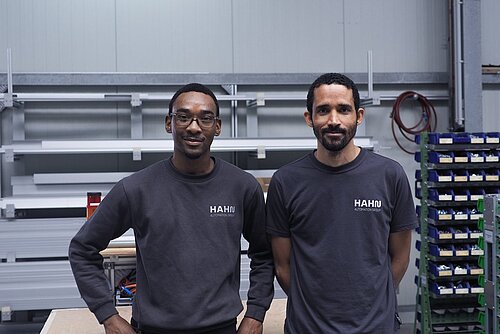When Condrad Kgomotso Sekgwathe and Nicholas Maphane started their internship at HAHN Automation Group in March 2023, they were surprised by more than just the working environment. "It had just snowed. The two had only ever seen snow on television," recalls Pascal Tailliar, Head of People & Culture, with a smile. At the time, it was unclear whether their three-week stay in the Hunsrück region would lead to permanent employment. Today, they both work as skilled workers in our Rheinböllen assembly department.
This was made possible by a joint project between the VDMA and the Botswana government that aimed to familiarize young skilled workers from Africa with the German dual training system through internships. Condrad and Nicholas completed training as mechatronics engineers in Botswana based on the German model. "Both made a very good impression during their internships. They were motivated, eager to learn, and impressive in their technical skills," recalls Tailliar. Receiving job offers after returning to Botswana was not only a personal stroke of luck for them, but also sent a clear signal from the company that international skilled workers are welcome.
A Long Road to Germany
However, many months passed between receiving the job offer and starting work. "The most challenging part was getting the training recognized by the IHK FOSA," Tailliar reports. New documents were repeatedly requested, some of which did not even exist in Botswana. "Communication was very difficult. Responses often took weeks to arrive. Without the support of the VDMA, which even contacted the First Lady of Botswana, the process would have been nearly impossible.”
In total, it took the two colleagues more than a year to finally receive their visas. Condrad arrived in November 2024, followed by Nicholas in January 2025. During this time, the company kept in regular contact with them, provided updates on the status of the process, helped them with organizational issues, and worked with them to prepare for their start in Germany—from enrolling them in language courses and helping them find accommodations to opening bank accounts.
Arriving in the Hunsrück Region
Today, they both live in Rheinböllen, just a few minutes away from their workplace. "The workday here is much faster and more structured than in Botswana," says Nicholas. "But we've settled in well." After work, they cook, relax, and make phone calls—to their family back home, who want regular updates about life in Germany.
Their colleagues' openness, support with bureaucratic hurdles, and positive team dynamics have made the transition easier for them. "When we were told that Germans weren't very friendly, I was skeptical. But here, we've experienced the opposite," says Condrad. Their colleagues are happy to help with language issues. They are patient and constantly encourage them to practice their German. This is the perfect complement to the language courses: A1 in Botswana and A2 in Germany.
Skilled Workers Welcome — But Obstacles Remain
For the company, the project is a win-win: it results in committed employees and a concrete contribution to securing skilled workers. "It's especially hard to find skilled workers in rural areas," says Tailliar. "That's why we are open to international avenues." At the same time, this example shows the urgent need for reforms. "Politicians make a lot of promises, but the bureaucratic hurdles are enormous in practice."
Tailliar advises other companies to plan all steps early on and to be patient. "You have to stay on top of things, provide explanations and support. But it's worth it. The candidates are highly motivated and committed.” For Condrad and Nicholas, one thing is certain: "We want to stay—maybe even with our families someday." This is a strong sign of how international cooperation creates long-term prospects.
